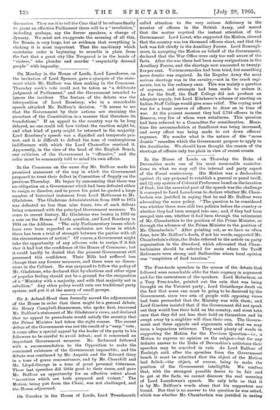In the House of Lords on Thursday the Duke of
Devonshire made one of his most memorable contribu- tions to what we may call the internal and party aspect of the Fiscal controversy. His Motion was a declaration against (1) any proposal to establish a general or penal tariff, and (2) any system of Colonial Preference based on the taxation of food; but the essential part of the speech was the challenge it conveyed to Lord Lansdowne to declare whether Mr. Cham- berlain was justified in saying that he and Mr. Balfour were advocating the same policy. "The question to be considered was whether there were still two policies before the country or whether they had been merged into one ; and, if they had been merged into one, whether it bad been through the retirement of Mr. Chamberlain to the position of the Prime Minister, or through the advance of the Prime Minister to the position of Mr. Chamberlain." After pointing out, as we have so often done, bow Mr. Balfour's deeds, if not his words, supported Mr. Chamberlain's claim, the Duke referred to the article on party organisation in the Standard, which advocated that Cham- berlainites should be selected for seats where the Tariff Reformers were strong and Balfourites where local opinion was "suspicious of food taxation."






































 Previous page
Previous page